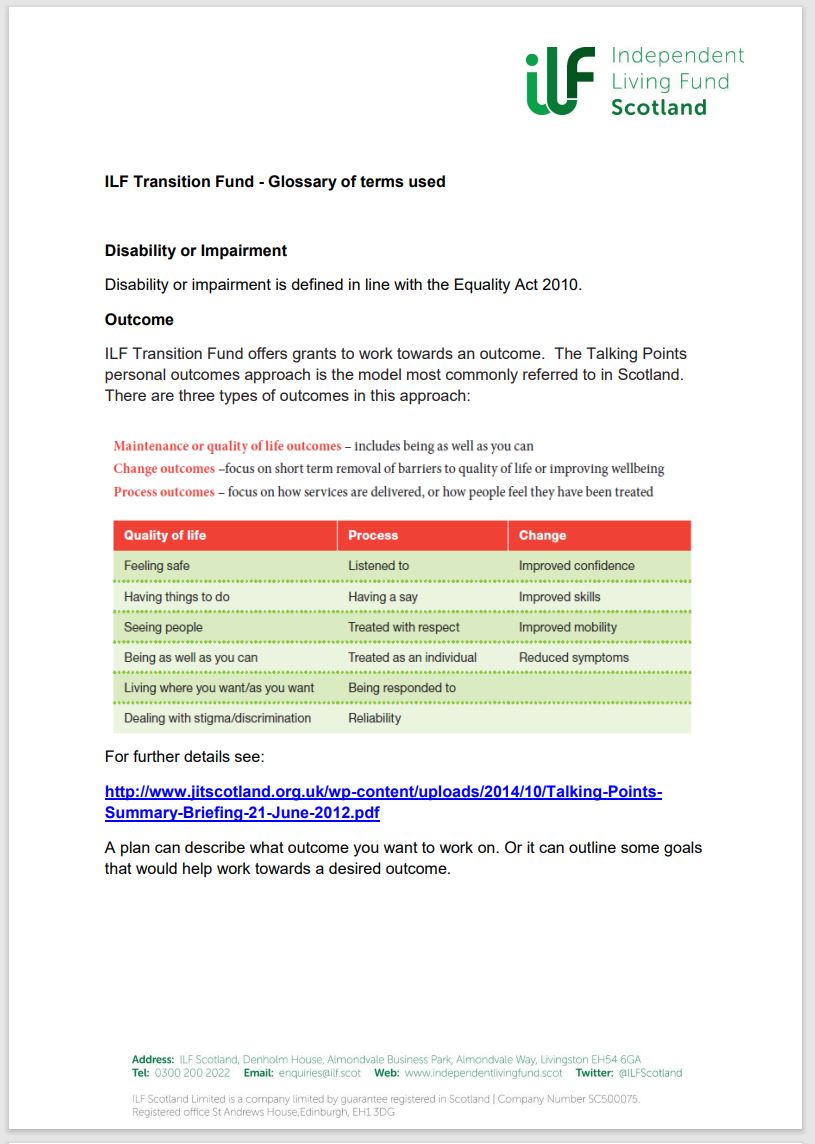
Disability or impairment is defined in line with the Equality Act 2010.
ILF Transition Fund offers grants to work towards an outcome.
The Talking Points personal outcomes approach is the model most commonly referred to in Scotland.
There are three types of outcomes in this approach:
| QUALITY OF LIFE | PROCESS | CHANGE |
|---|---|---|
| Feeling safe | Listened to | Improved confidence |
| Having things to do | Having a say | Improved skills |
| Seeing people | Treated with respect | Improved mobility |
| Being as well as you can | Treated as an individual | Reduced symptoms |
| Living where you want/as you want | Being responded to | |
| Dealing with stigma/discrimination | Reliability |
For further details see: http://www.jitscotland.org.uk
A plan can describe what outcome you want to work on. Or it can outline some goals that would help work towards a desired outcome.
A goal is a target that a person wants to reach. A goal can be considered as a milestone or step on a journey. While goals are milestones that a person wants to achieve, outcomes are the possible results that will be achieved when a person completes the milestone. Goals can be short term or long term.
For the purposes of the ILF Transition Fund, a plan must be person led and detail the outcome or goal the applicant wants to work towards or achieve to change their lives. The plan will be set out around SMART principles. That is the plan outlines outcomes or goals that are Specific, Measurable, Achievable, Realistic, Timely.
The plan should also detail:
Funded support which may be provided by a Local Authority (LA) following assessment of need with the intention of empowering assessed individuals to take as much control and responsibility as they want over their own support arrangements. The Social Care (Self-directed Support) (Scotland) Act 2013 places a duty on LA to offer four choices as to how individuals receive their support.
Get more information on the Self-Directed Support Scotland website
Disabled people may face barriers which restrict their involvement in activities of their choice, prevent them accessing opportunities like education, volunteering or forming relationships with peers.
Presence and participation refers to being able to maximise choices by accessing recreational, leisure, educational activity in their community or locality and out with a residential or hospital setting.
Community may refer to a group of people in the same place e.g. a community leisure centre. Or it may refer to a group that share a characteristic or interest e.g. a walking group.
Community can also refer to having certain attitudes and interests in common, e.g. the sense of community that organized religion can provide or an online community of people who share an interest in a particular topic or issue.
The principle that disabled people are able to exercise their human rights and citizenship in the same way that non-disabled people can - the focus is on choice and control and covers all aspects of disabled people’s lives. Registered Care Services “care service” means any of the following:
a. a support service,
b. a care home service,
c. a school care accommodation service,
d. a nurse agency,
e. a child care agency,
f. a secure accommodation service,
g. an offender accommodation service,
h. an adoption service,
i. a fostering service,
j. an adult placement service,
k. child minding,
l. day care of children,
m. a housing support service, as defined in the Public Services Reform (Scotland) Act 2010